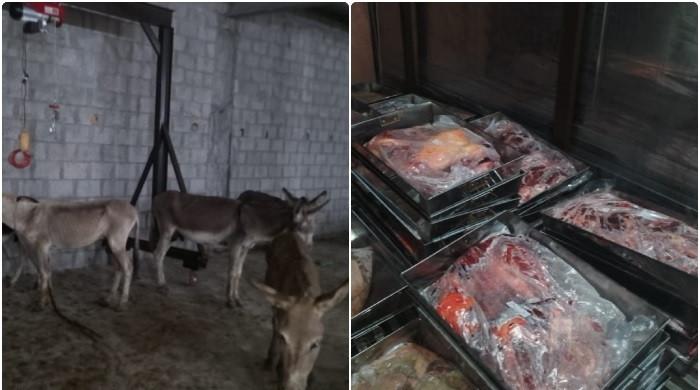Illegal Slaughterhouse Raided: Donkey Meat Seized Near Islamabad
The Islamabad Food Authority (IFA) conducted a significant raid on an illicit slaughterhouse in Tarnol, situated approximately three miles from the federal capital. The operation led to the discovery of approximately 1,000 kg of donkey meat.
According to the IFA’s communication officer, authorities discovered over 50 donkeys along with a substantial supply of packaged meat at the location.
Preliminary investigations indicate the meat may have been intended for international export.
The Director of the IFA has mandated the immediate filing of a First Information Report (FIR) against all individuals implicated in the operation. Authorities have confirmed that the confiscated meat is currently undergoing destruction by the IFA team.
Dr. Tahira Siddique, the Authority’s Deputy Director, verified the total quantity of seized meat as one tonne.
A foreign citizen present at the site has been taken into custody, and law enforcement is currently investigating potential distribution points of the meat.
A report by the Pakistan Bureau of Statistics (PBS) in June indicated that the donkey population in Pakistan has increased by 109,000 in the last year, climbing from 5.938 million to 6.047 million.
With Pakistan’s donkey population growing, China is a vital market where donkey meat is used in food, and the hides are utilized to produce e-jiao, a traditional medicinal gelatin.
Past export limitations, due to delays in finalizing necessary protocols, have now been resolved.
A report last year cited animal welfare organizations and veterinary specialists, pointing out that China’s need for e-jiao results in the slaughter of millions of donkeys worldwide on an annual basis.
A slaughterhouse in Gwadar has initiated production to meet the rising demand in China for donkey meat, bones, and hides used in creating the traditional e-jiao product.
The e-jiao sector requires around 5.9 million donkey skins each year, creating immense pressure on global donkey populations, based on a report issued by The Donkey Sanctuary, a British animal welfare charity.
E-jiao has a 3,000-year history traced to Shandong province, which accounts for about 90% of China’s e-jiao production.
Chinese state media acknowledges it as a “national cultural heritage” and one of the most significant components of the traditional Chinese medicine sector.



Comments (0)
No comments yet. Be the first to comment!
Leave a Comment